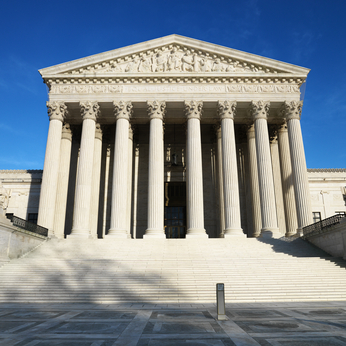 On March 24, 2014, the United States Supreme Court heard oral arguments in the matter of Clark v. Rameker (In re Clark). The court appeared to be divided over reconciling the plain language of the Bankruptcy Code with what could be considered a windfall for the debtor. Clark involves the dispute over whether creditors can reach a debtor’s non-spousal inherited individual retirement account (“IRA”) in bankruptcy.
On March 24, 2014, the United States Supreme Court heard oral arguments in the matter of Clark v. Rameker (In re Clark). The court appeared to be divided over reconciling the plain language of the Bankruptcy Code with what could be considered a windfall for the debtor. Clark involves the dispute over whether creditors can reach a debtor’s non-spousal inherited individual retirement account (“IRA”) in bankruptcy.
The Bankruptcy Code allows debtors to claim certain property as exempt by utilizing exemptions under state law or those specifically provided in the Bankruptcy Code.[1] Sections 522(b)(3)(C) and (d)(12)[2] allow debtors to exempt retirement funds, even where the state has opted out of the federal exemptions.
Heidi Heffron-Clark and her husband Brandon Clark (the “Clarks”) filed for bankruptcy relief under chapter 7 in 2010 in the Western District of Wisconsin. The chapter 7 Trustee and a judgment creditor objected to the debtors’ claim of an exemption in an IRA inherited pre-petition from Ms. Heffron-Clark’s deceased mother. In determining that an inherited IRA did not constitute an exempt retirement fund under the Bankruptcy Code, Bankruptcy Judge Martin reasoned that the debtors received distributions from the IRA immediately with no regard to their age, physical health or working status. See In re Clark, 450 B.R. 858 (Bankr. W.D.Wis. 2011).
The debtors appealed the decision and the United States District Court for the Western District of Wisconsin reversed the Bankruptcy Court’s decision. See In re Clark, 466 B.R. 135 (W.D.Wis. 2012). The Trustee and judgment creditor then appealed to the Court of Appeals for the Seventh Circuit.
Chief Judge Easterbrook, writing for a unanimous Seventh Circuit, reversed the District Court’s opinion. Judge Easterbrook and his brethren agreed with the Bankruptcy Court’s determination that the inherited IRA is not an exempt retirement fund under the Bankruptcy Code. Click here to view In re Clark, 714 F.3d 559 (7th Cir. 2013). Judge Easterbrook explained that once Ms. Heffron-Clark inherited the IRA, many of its attributes were altered, including, among other things, the fact that distributions commenced within one-year of the original owner’s death and were completed within five years.[3] “In other words, an inherited IRA is a time-limited tax-deferral vehicle, but not a place to hold wealth for use after the new owner’s retirement.” Id. at 561. Thus, Judge Easterbrook concluded that the Bankruptcy Court was correct in holding that the inherited IRAs simply do not qualify for exemption under Section 522 of the Bankruptcy Code because they are not savings preserved for use after their owners retire. Id. at 562.
The Seventh Circuit ruling clashes with decisions to the contrary in both the 5th and 8th Circuits. The Clarks appealed the decision to the United States Supreme Court, which granted certiorari on November 26, 2013. The Supreme Court’s decision will resolve the split among the Circuit courts and will have a significant impact on future retirement and bankruptcy planning.
Melissa A. Guseynov, an associate of the firm, contributed research and reporting for this article.
About Weltman & Moskowitz, LLP, A New York and New Jersey Bankruptcy, Business and Creditors’ Rights Law Firm:
Richard E. Weltman and Michael L. Moskowitz founded Weltman & Moskowitz, LLP in 1987. Weltman & Moskowitz, LLP is a business, creditor’s rights and bankruptcy law firm serving clients in New York, Long Island, New Jersey and beyond. Melissa Guseynov is an associate of the firm.
The firm concentrates on lender’s rights, corporate insolvency, resolution of commercial disputes, loan workouts and modifications, shareholder and partnership contests, business divorce, dissolution, and business and bankruptcy litigation, arbitration, and mediation of all types. The firm also assists with corporation, partnership, and limited liability company counseling, formation, operation, and preparing and negotiating many kinds of secured lending, leasing, shareholder, buy-sell, consulting, technology, and joint venture agreements. Michael and Richard may be reached at 212.684.7800, 201.794.7500, or via email at mlm@weltmosk.com or rew@weltmosk.com.
[1] States can “opt out” of certain exemptions in the Bankruptcy Code and require debtors to use state law exemptions.
[2] The language of Sections 522(b)(3)(C) and (d)(12) is identical.
[3] Distributions may last longer than five years for certain specific accounts.







